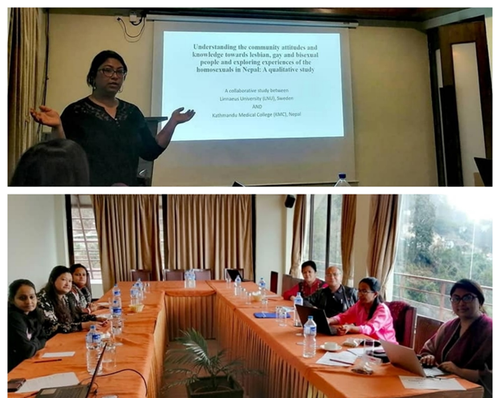Understanding the community attitudes and knowledge towards lesbian, gay and bisexual people and exploring experiences of the homosexuals in Nepal: A qualitative study, collaboration between Kathmandu Medical College (KMC) and Faculty of Health and Caring Sciences, Linnaeus University (LnU), Sweden
Principal Investigator: Prof. Dr. Sunil Kumar Joshi, Head of Department of Community Medicine
Sexual minorities are often among the most marginalized thus most of the Sustainable development goals (SDG) apply to them. The list of relevant goals can be made very long; poverty, health, education, gender equality, violence, social and political inclusion, access to justice and non-discriminatory laws, housing, inclusive cities, decent work and economic growth and of course each of these issues influences the others. KMC has been inclusive in its research and generating evidence through lens of intersectionality for an inclusive research culture.
Since March 2021, a collaborative research titled, “Understanding the community attitudes and knowledge towards lesbian, gay and bisexual people and exploring experiences of the homosexuals in Nepal: A qualitative study” started between KMC and Linnaeus University Kalmar Sweden. This ongoing study is co-led by Prof. Dr. Sunil Kumar Joshi and Dr. Poonam Rishal in Nepal and Prof. Katarina Swahnberg in Sweden and is funded by the University. Heteronormativity and homophobia creates stigma, discrimination and violence against lesbian, gay and bisexual people (LGB). LGB people face discrimination in work life, health and education as well as violence and hate crimes leading to psychosocial problems and poorer health, including mental health, and quality of life compared to heterosexuals. Recognizing that the MDGs failed certain people and countries, the 2030 agenda sets out to “reach the furthest behind first” and concludes with a pledge that “no one will be left behind”. Therefore, the situation of LGB people requires specific attention in order to achieve the vision of the SDGs. Nepal recognized the LGB community and de-criminalized homosexuality in 2007. But still social norms based on patriarchy and heteronormativity as well as hindu religion, require young adult men and women to marry and procreate at early age in Nepal. Thus, there are limited opportunities for people from non-normative sexual orientation to express themselves. Hence, this study aims to explore experiences and community perceptions of LGB which may enhance our understanding of the community perceptions, knowledge and attitude towards LGB people to inform interventions that help develop inclusive and sustainable community for LGB people in Nepal. In addition, also aims to conduct policy analysis to assess how LGBTQI became an agenda at the policy and political level.

Brainstorming session on the project

